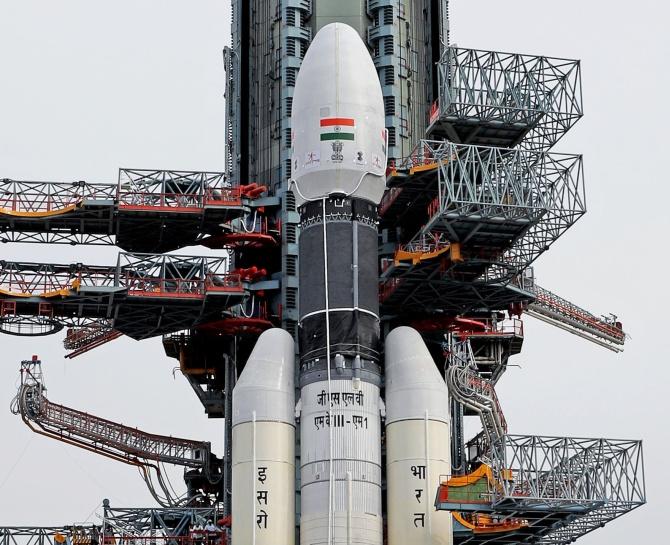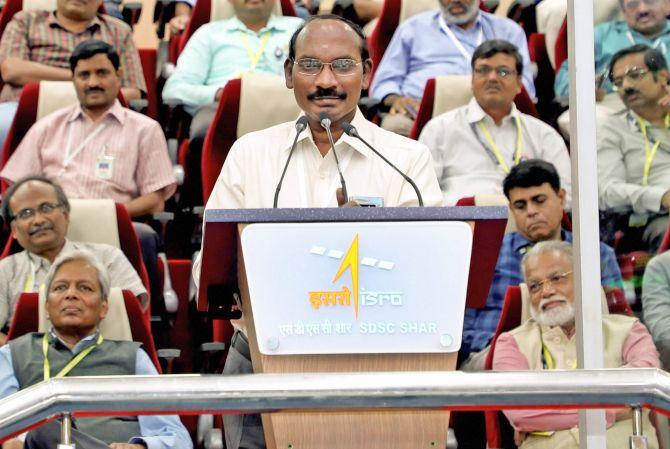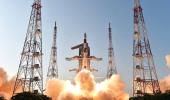'It is time we Indians learnt to believe in ourselves, and stopped questioning our own capabilities every time a space launch is not a glorious success,' says M D Riti.

Man has set foot on the Moon
The moon is but Dehra Dun
Do I see a sneer on your lips, dear reader, as you read these words? Are you thinking: Oh yes, our Indian space agency obviously thought that going to the moon was as simple as going to Dehra Dun.
And that's why the mission fell flat (pun intended).
I clearly remember the lyrics of this old P B Sreenivas song, playing on a gramophone record in the living room of my home when I was a toddler.
Neil Armstrong had just become the first astronaut to walk on the moon. A little later, I was drawing the space flight of the Apollo missions in my primary school science classes.
Little did I realise then that the space programme was literally going to walk into my living room a couple of years later.
In the form of a certain tall, slim young man who eventually married my sister. And thereby began my lifelong interest in India's space programme.
We now have a family tradition whereby every toddler in the extended family is introduced to India's space programme by a beloved now octogenarian co-founder of the programme through a collection of memorabilia that mark the successful launches of ISRO and even some global space agencies
Successful launches? Do I see you raise a sceptical eyebrow? Do I hear you whisper: But we are all mourning India's first 'partially successful' moon mission?
Actually, what happened last week was nothing new. The first developmental flight of every new generation of launch vehicles (this is the fourth) so far has failed.
The Satellite Launch Vehicle (SLV-3 E1), the first one made in India, was launched on August 10, 1979.
A jammed valve in its second stage control system caused the oxidiser to leak, leading to what was termed a partially successful launch.
Eight years and three successful SLV launches later, the Augmented Satellite Launch Vehicle failed the first two times it was fired.
A little over 15 months later, ISRO tried the ASLV again. This time, the flight failed 46 seconds after lift-off, causing the resultant debris to crash into the sea, and my young devilish nephews and their friends, whose fathers also worked for the space programme, sarcastically expanded SLV to Sea Loving Vehicle.
It was only after another four years of design changes and improvements that the ASLV finally had two successful flights, in 1992 and 1994.
Likewise, the PSLV too failed on its first ever launch on September 20, 1993.
But ISRO was fairly satisfied with this launch; its scientists said most of the launcher's systems had performed satisfactorily.
We have asked, many times, over the years: Do we really need an expensive space research programme in a country with such a large, economically handicapped population? Space research has always quietly taken a substantial piece of our national budgets.
For the longest time, it was only a cost centre, and only some years ago did it make a token attempt to earn back a part of that spend by selling its satellite launching capabilities to other countries.
Do we really need an Indian mission on the moon?
Well, did we imagine what would be the benefit we would derive from all those satellites when they were launched? And today, can we do without the communication network they offer us? You would not be reading this article on the Internet if those satellites did not exist.

The Indian space programme had a great vision, half a century ago, when a great man called Vikram Sarabhai foresaw its potential.
It began as a program in which we started from scratch, with men like A P J Abdul Kalam and my brother-in-law R Aravamudan building basic rockets in an old government building outside Thiruvananthapuram, and literally firing them from the Thumba beach.
Why? Why cant it be a collaborative development, just as so many innovations are today? Why can't we just buy/borrow/hire from the West? After all, the US put a man on the moon half a century ago!
The answer came blindingly to our country when the cryo engine deal that India had signed off on with the USSR fell through over two decades ago simply because the US threatened the USSR with economic sanctions.
The Indian space programme, which had happily hoped to bypass a few years of R&D by buying cryoengine technology discovered the hard way that there are no short cuts in this area.
Just as there are none in defence research. Every country wants to eventually safeguard their own interests.
And the superpowers would never hesitate to pull back whatever assistance they were giving India in areas crucial to us, just to put our country in its place.
There are certain areas, like space research, where the old classic type of research in which you start from scratch, reinvent the wheel and own the foundation of your research.
Obviously, every test drive in these areas would result in a atrial failure. Because, they are almost like proof of concept projects.
Today, a geographically tiny and economically weak country like ours is considered a superpower in space research.
Do we really to spend all that money to be that? Yes we do, because we need the power of independence of communication.
And if that takes us to the moon, not this year, but some years down the line, so be it.
By the way, I searched the Net quite diligently for any sign of that old P B Sreenivas song, but could find none.
But I know it definitely exists somewhere. I am sure it will surface again one of these days, soon enough.
Just as I am sure that the Indian space programme will launch a successful moon mission soon enough too.
It is time we Indians learnt to believe in ourselves, and stopped questioning our own capabilities every time a space launch is not a glorious success.










